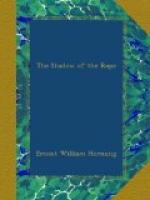Langholm, however, his wits immensely quickened by the tonic of his new discovery, began to see possibilities in this aspect of the matter, and, as soon as the telegraph offices were open, he despatched a rather long message to Mrs. Steel, reply paid. It was simply to request the business address of her late husband, with the name and address of any partner or other business man who had seen much of him in the City. If the telegram were not intercepted, Langholm calculated that he should have his reply in a couple of hours, and one came early in the forenoon:—
“Shared office
2 Adam’s Court Old Broad Street with a Mr. Crofts
his friend but not mine
Rachel Steel.”
Langholm looked first at the end, and was thankful to see that the reply was from Rachel herself. But the penultimate clause introduced a complication. It must have some meaning. It would scarcely be a wholly irrelevant expression of dislike. Langholm, at all events, read a warning in the words—a warning to himself not to call on Mr. Crofts as a friend of the dead man’s wife. And this increased the complication, ultimately suggesting a bolder step than the man of letters quite relished, yet one which he took without hesitation in Rachel’s cause. He had in his pocket the card of the detective officer who had shown him over the Black Museum; luckily it was still quite clean; and Langholm only wished he looked the part a little more as he finally sallied forth.
Mr. Crofts was in, his small clerk said, and the sham detective followed the real one’s card into the inner chamber of the poky offices upon the third floor. Mr. Crofts sat aghast in his office chair, the puzzled picture of a man who feels his hour has come, but who wonders which of his many delinquencies has come to light. He was large and florid, with a bald head and a dyed mustache, but his coloring was an unwholesome purple as the false pretender was ushered in.
“I am sorry to intrude upon you, Mr. Crofts,” began Langholm, “but I have come to make a few inquiries about the late Alexander Minchin, who, I believe, once—”
“Quite right! Quite right!” cried Crofts, as the purple turned a normal red in his sanguine countenance. “Alexander Minchin—poor fellow—to be sure! Take a seat, Inspector, take a seat. Happy to afford you any information in my power.”
If Mr. Crofts looked relieved, however, as many a decent citizen might under similar visitation, it was a very real relief to Langholm not to have been found out at a glance. He took the proffered seat with the greater readiness on noting how near it was to the door.
“The death of Mr. Minchin is, as you know, still a mystery—”
“I didn’t know it,” interrupted Crofts, who had quite recovered his spirits. “I thought the only mystery was how twelve sane men could have acquitted his wife.”
“That,” said Langholm, “was the opinion of many at the time; but it is one which we are obliged to disregard, whether we agree with it or not. The case still engages our attention, and must do so until we have explored every possible channel of investigation. What I want from you, Mr. Crofts, is any information that you can give me concerning Mr. Minchin’s financial position at the time of his death.”




